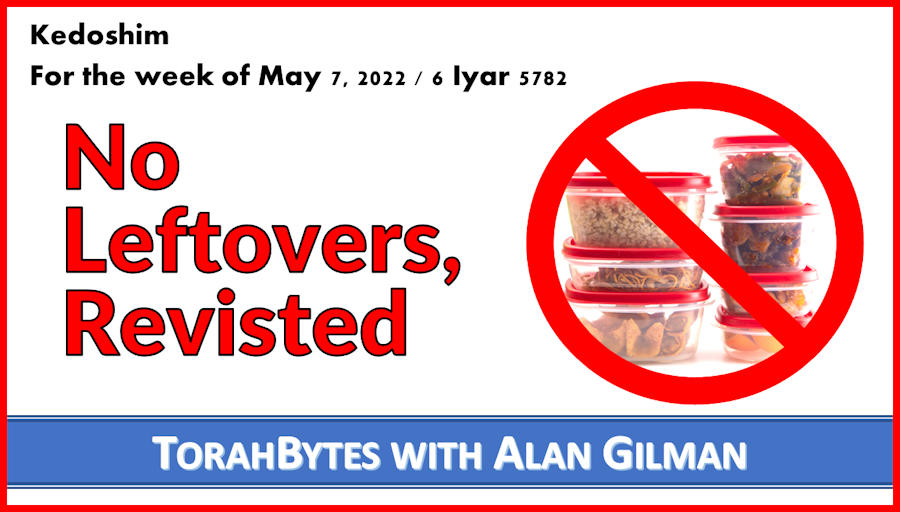For the week of May 7, 2022 / 6 Iyar 5782

Kedoshim
Torah: Vayikra/Leviticus 19:1 – 20:27
Haftarah: Amos 9:7-15
Download Audio [Right click link to download]
When you offer a sacrifice of peace offerings to the LORD, you shall offer it so that you may be accepted. It shall be eaten the same day you offer it or on the day after, and anything left over until the third day shall be burned up with fire. If it is eaten at all on the third day, it is tainted; it will not be accepted, and everyone who eats it shall bear his iniquity, because he has profaned what is holy to the LORD, and that person shall be cut off from his people. (Vayikra/Leviticus 19:5-8)
In the past I have commented on God’s directives of not allowing certain offerings to be eaten beyond a certain time. That message dealt with the thanksgiving offering, a variant of the peace offering, which was to be fully consumed on the same day it was offered. At that time, I suggested that not allowing it to stay around for longer ensured that it was being used exclusively for its intended purpose.
This week, we see a different type of the peace offering that could be eaten through the next day. Anything left over afterward had to be burned up. We are told in the Hebrew that by the third day the meat becomes “pigool.” The sense is similar to the normal expression of unacceptability, “ta-may.” Ta-may is most often translated “unclean,” denoting ritualistic defilement, while pigool appears to have the sense of “stinks.” These leftovers may not actually stink, though in the context of ancient Israel, they might. The point, however, is that as far as this offering is concerned, the meat has gone bad, and is no longer suitable.
In contrast to the other offering, there was no obligation to finish off the meat the same day. Leftovers were allowed, but only for one day and no more. There is therefore an urgency and intensity lacking. Thus, one engaged these offerings in a more laid-back fashion. And yet, there is still something key that was not to be neglected: that which was set apart for God was for God alone. It appears that allowing for an extra day of consumption didn’t distract from this, while any additional time likely would have.
Some people might be surprised that sacrifices were eaten by the one offering it. Some were not consumed by humans at all. Others included a portion for the cohanim (English: priests). But the peace offerings were divided between God, the cohanim, and the one offering the sacrifice. This reminds us that sacrifices are not always and only about giving up something completely. It has more to do with giving the thing over to God. That might include continued relationship to it. However, when such an ongoing relationship exists, it is essential to remember that the thing from that time forward always remains God’s property to do with what he wants.
This should help us to better understand the call under the New Covenant to give our bodies as a living sacrifice to God (see Romans 12:1). To do so isn’t accomplished by somehow completely disconnecting ourselves, giving our will away to a cause or an organization. Neither is it to absolve ourselves forever from personal responsibility. Far from it! It is that we come to a place where we truly fulfill our role as stewards of God’s creation (see Bereshit/Genesis 1:26-28). This doesn’t cut us off from deriving benefit from life. In fact, as we fully live out our callings, we discover blessings we never dreamt of when we were living for ourselves. But as we enjoy the great benefits of serving God, we must not be distracted by enjoying them for their own sakes. Rather, we need to always remember that they, as we ourselves, have been fully given over to our Lord and King.
Scriptures taken from the English Standard Version
This passage is one that makes me think of why the Messiah was raised by the third day, other wise it would not be an acceptable offering.